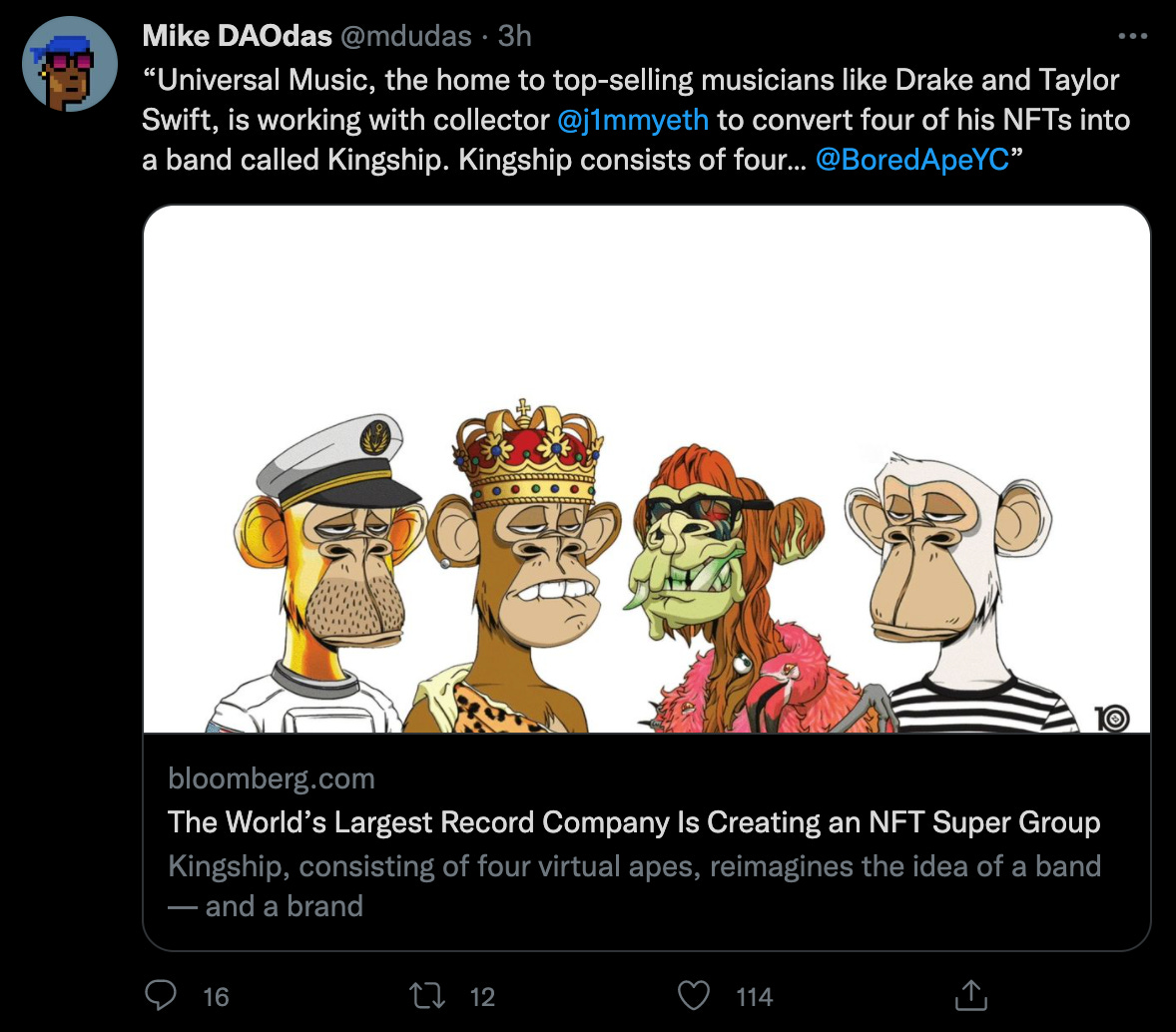DAOs are for doing crimes
Plus Tim Apple likes the Corn and in Metaverse Miami, taxes pay you!
In this issue:
DAOs are for doing crimes
Should Bitcoin do a stock split? (Reader Submitted)
Tim Apple likes the Corn
In Metaverse Miami, taxes pay you!
DAOs are for doing crimes
"I was wondering what you thought about DAOs - what they are, why are they special, and what kind of a future could be enabled if DAOs take off in a big way?" — CL
A DAO is a decentralized autonomous organization — the DeFI equivalent of a company. DAOs replace the traditional structure of a corporation (shareholders, board of directors, management team, etc) with a smart contract. A corporation raises money from shareholders to invest in a (hopefully) profitable business, but a DAO raises money from tokenholders to invest in a (hopefully) profitable business.
The token that powers the DAO (usually called a governance token) entitles the owners to vote on any decisions the DAO makes and (usually) to collect a share of its profits. So a DeFi Lending DAO could raise funds by selling governance tokens in order to loan those funds out at interest. Owners of the governance token could then vote on things like what interest rates to set and whether to reinvest any profits or pay them out as dividends to token holders.
A DAO has a handful of advantages over a traditional corporation. Since all their logic and accounting lives on the blockchain they can theoretically be perfectly transparent and verifiable. But mostly DAOs are handy if what you plan to do is crimes.1 Since ownership and payments are tied to public keys and not real world identities anyone can participate anonymously — and if authorities don’t know who anyone is it will be challenging to figure out who to arrest. A DAO is like a company where everyone is always wearing creepy ceremonial masks.
People often tout the participatory benefits of DAOs but I’m not sure I see the advantages there. Exercising governance rights in a DAO requires considerable technical expertise and expensive on-chain transactions. Traditional shareholder campaigns already struggle with voter apathy and fatigue — adding a steep bill and a confusing tech stack does not improve investor access. DAOs are for doing crimes.
A nicer way to phrase "doing crimes" might be "regulatory arbitrage." DAOs don’t belong to anybody and they don’t exist anywhere, so a plausible case can be made that they are not in anyone’s jurisdiction. The blockchain is basically international waters.
So DAOs are useful if you want to raise money and you aren’t interested in the pesky details of knowing who your investors are. They can offer products/services that banks and exchanges aren’t allowed to, like high-interest yields or unregistered securities. And they are good at ignoring borders and sanctions. You know — crime stuff.
Crimes in this case doesn’t necessarily equate to ripping off customers — consider how Uber violated taxi regulations or how AirBnB ignored hotel laws. Sometimes regulations protect consumers but sometimes they protect incumbent businesses. Financial laws are complex, restrictive and burdensome — it genuinely is easier to experiment and innovate quickly if you ignore them.
I don’t mean to say that only criminals are using DAOs, by the way — I just mean only the criminal usage makes sense. Everyone else is being ridiculous.2
Should Bitcoin do a stock split?
"I did a quick search of your archive, and it seems like you've touched on this in the past, but I would be interested to learn if it's actually feasible for a blockchain to do a "stock split". I know the whole thing is kind of dumb but I do think ETH and BTC are both too high now to make normal transactions understandable, and gwei and satoshis are too small. It would actually be useful to bring the units back down into the <$100 range. I’m curious what it would take for that to happen and if there are any downsides?" — MJ
If we were more rational investors then changing units wouldn’t change our opinion of assets — prices don’t change if they are listed in quarters instead of dollars. But in practice investors absolutely do care about the unit price of things. It just feels better to own 10 of something than it does to own 1/10th of something. Stocks that split tend to outperform stocks that don’t split by ~8% in the following year and ~12% over the next three years after the split. People can’t help being swayed by the ticker price.
Feeling cheap is a key element of the success of memecoins. Becoming a Shiba Inu millionaire only costs ~$53. That would buy you ~0.00083/BTC at the moment. $53 worth of Bitcoin is much more valuable than $53 worth of Shiba Inu but one million of something is much more fun than ~0.00083 of something. So I definitely agree with your premise that it would be good if the normal unit we used to talk about Bitcoin was a normal amount that people used in their everyday life.
The good news is that we wouldn’t need to change anything about Bitcoin to make that change — any wallet or exchange can make an independent choice about what units to use when they display quantities of Bitcoin as easily as they can decide what color to make the text. The bad news is that most of this software is already making conscious decisions about what units to use, so the patterns you are seeing today are generally not accidental.
Bitcoin-only exchanges want you to think of Bitcoin as cheap (so you will buy more of it) and they tend to prefer smaller units like satoshis. Multicoin exchanges want you to think of Bitcoin as expensive (so other coins look like bargains) and so are more likely to use full bitcoin as their preferred unit. Eventually we’ll probably shift to a convention of using smaller bitcoin units of some kind — but only once it becomes more profitable than the alternative.
Tim Apple likes the Corn
In an interview on Tuesday Tim Cook, CEO of Apple, disclosed that he personally owned cryptocurrency and that he thought it was a "reasonable" part of a diversified portfolio. He wasn’t specific about which cryptocurrency or cryptocurrencies he owned although the question technically did specify "Bitcoin or Ethereum."
Cook laid out a few things Apple would not do with cryptocurrency. For starters, they won’t be using Apple’s $200B in cash reserves to buy Bitcoin à la Microstrategy. As Cook put it, "I don’t think anyone is buying Apple stock to get exposure to crypto." They also won’t be taking cryptocurrency payments for Apple products. Why would they? Apple customers have credit cards.
If you listen carefully to the question, though, the question was not about Apple’s cash reserves or about taking cryptocurrency as payment for Apple products, it was about accepting cryptocurrency as a form of payment for Apple Pay. The distinction is subtle but important — and certainly not lost on Mr. Cook. Perhaps he was deliberately being coy about Apple Pay’s plans?
Cryptocurrency support is already a feature of CashApp, Venmo, Paypal and other competitors — so support on ApplePay is probably inevitable at some point. Apple Pay is the top mobile payment system in America (with ~44M users) and has ~0.5B users globally (by way of comparison Coinbase has ~73M users worldwide).
The big question in terms of market impact isn’t really how many users Apple Pay has but how many of them are new to crypto — Coinbase is routinely one of the best performing apps in the App Store already. It is unclear how many iPhone users are interested in buying crypto but haven’t already.
Other things happening right now:
After reaching a price of ~$69k/BTC on Wednesday the market abruptly swung back around and dropped to ~$64k/BTC. Bitcoin bulls got over-eager — there was a huge uptick in leveraged longs with BTC as collateral. We talked about how the rise before that was more credible precisely because it was not driven by leverage. Wednesday’s price action was the opposite of that:
Digital artist Beeple (who we’ve talked about a few times before) recently made another major NFT sale — a piece titled Human One that sold for ~$29M. It’s a seven foot digital sculpture of an astronaut walking through various landscapes that the artist will add to throughout his lifetime. He appeared on The Tonight Show with Jimmy Fallon to talk about the sale and Jimmy Fallon mentioned he had just bought his own first NFT — a bored ape:
Mayor Francis Suarez of Miami (who manages to come up surprisingly frequently here) launched a token called Miamicoin in August that works a little bit like a municipal bond. When investors buy Miamicoin they are basically loaning money to the Stacks protocol (a smart contract platform that is built on top of Bitcoin). Miami then splits the resulting profit from that loan with investors. Why don’t investors just invest in Stacks directly? I don’t know civic pride maybe. Mayor Suarez hopes this revenue stream will eventually make Miami a tax free city. I think it is good to believe in your dreams.
In my youth if a record label wanted to artificially form a pop supergroup they had to hire a pack of blandly good-looking teenagers to populate it. It was a simpler time. Now they can just license the rights to some cartoon apes. Gorillaz fans in shambles right now.
Presented without comment:
Probably don’t do crimes? This is not legal advice.
There is a DAO somewhat unsuccessfully attempting to become a legal entity in Wyoming, for example — perfect for anyone who thinks code is law but also law is law.








